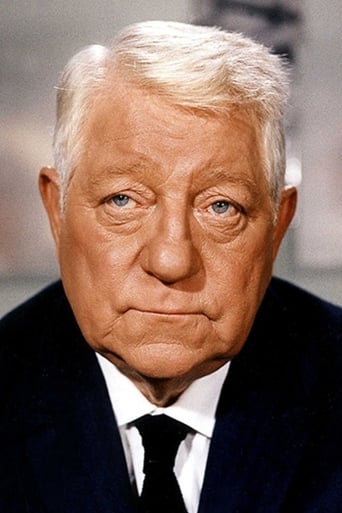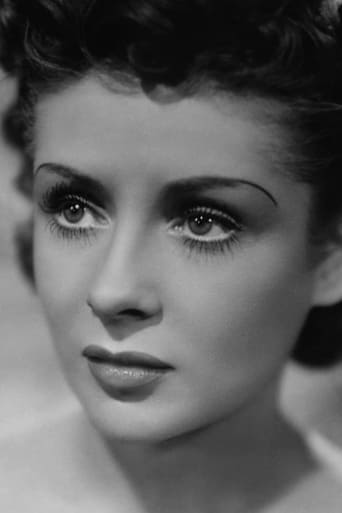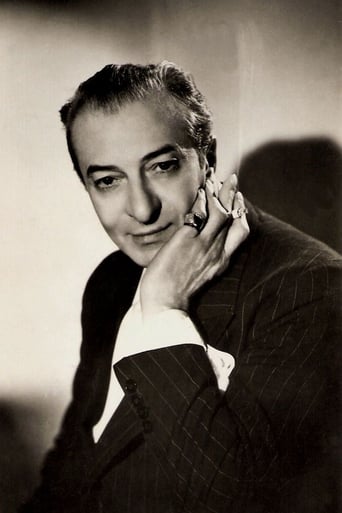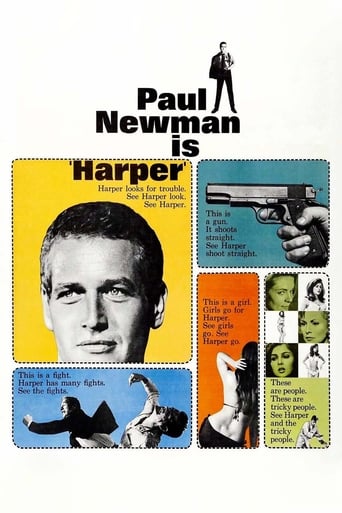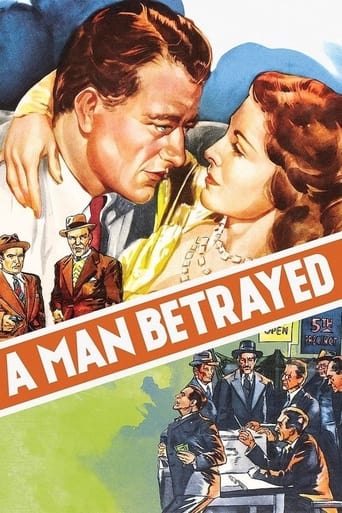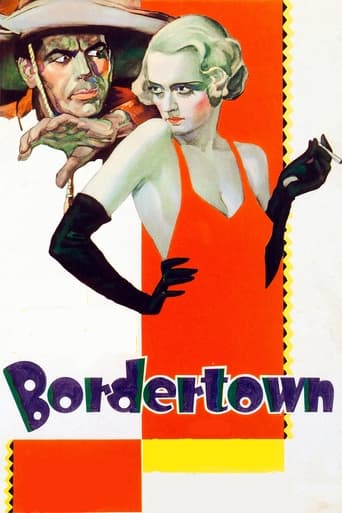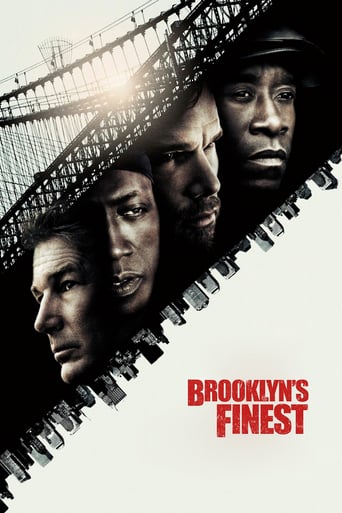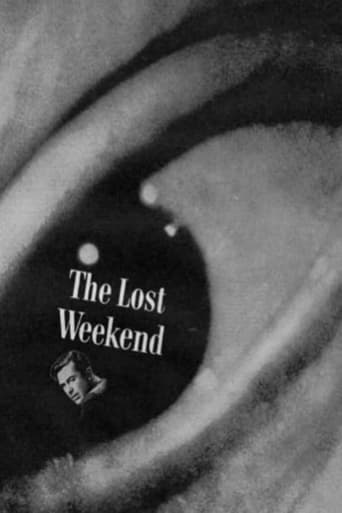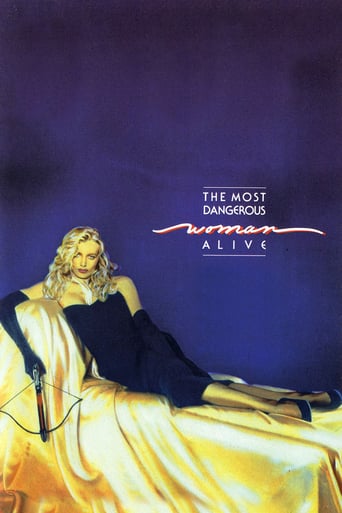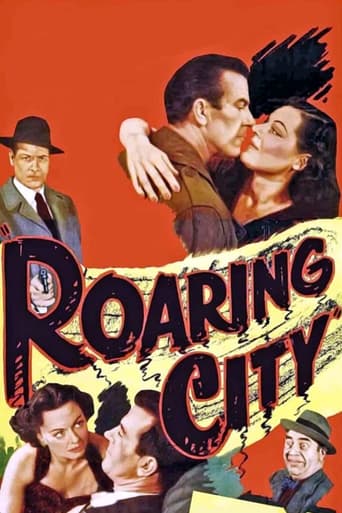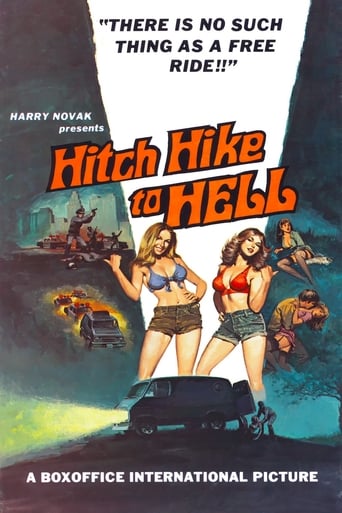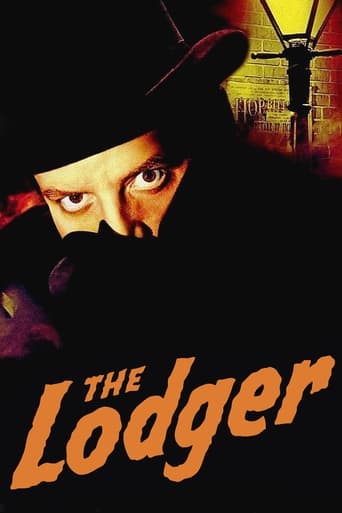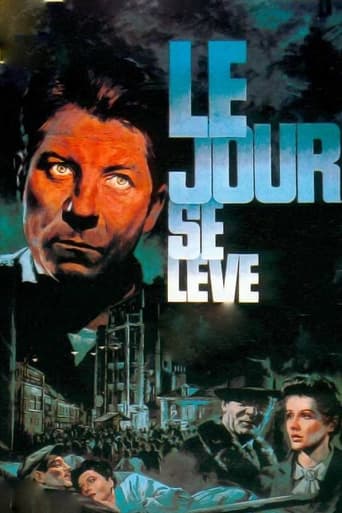
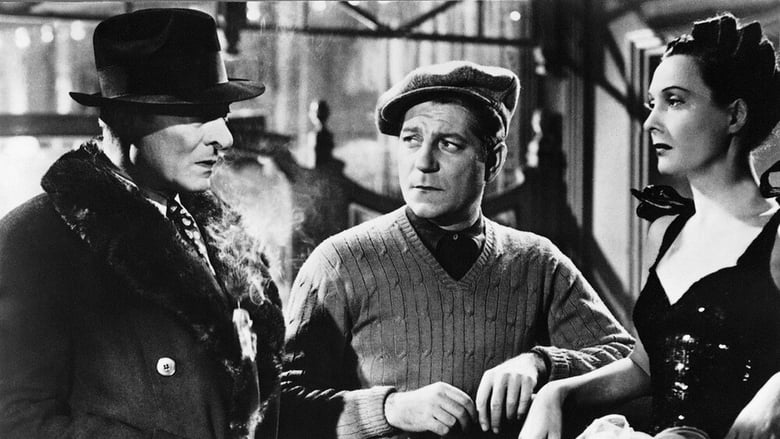
Daybreak (1939)
After committing a murder, a man locks himself in his apartment and recollects the events the led him to the killing.
Watch Trailer
Cast
Similar titles
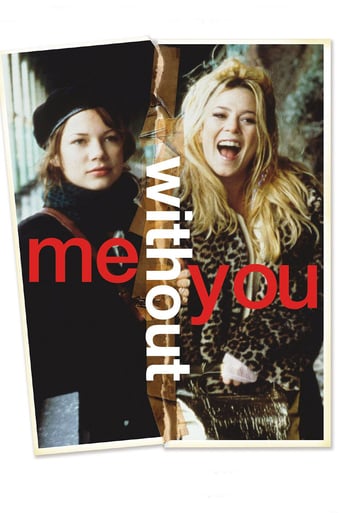
Reviews
One of my all time favorites.
Great Film overall
I am only giving this movie a 1 for the great cast, though I can't imagine what any of them were thinking. This movie was horrible
There are moments in this movie where the great movie it could've been peek out... They're fleeting, here, but they're worth savoring, and they happen often enough to make it worth your while.
I found this French film in the book 1001 Movies You Must See Before You Die, it was rated very well and the plot sounded good, so I was looking forward to what would hopefully be a good foreign language film, directed by Marcel Carné (Les Enfants du Paradis). Basically factory worker François (Jean Gabin) has shot and killed M. Valentin (Jules Berry), and following this he has locked himself in his guest house room on the top floor of the building with many flights of stairs, the police soon arrive to arrest him, they fail to shoot their way into the room as François has barricaded the door. In a series of flashbacks, occasionally returning to the present to see his attempts to avoid being caught, it is revealed François had been having a relationship with both naive floral shop worker Françoise (Jacqueline Laurent) and more experienced performing assistant Clara (Arletty), who until meeting him was working with Valentin for his performing dog act. Valentin is manipulative and had also become involved with both women, and becoming jealous of François, as a constant liar he even tries to convince his foe that he was Françoise's father, but in fact both she and François were raised in orphanages. The rivalry between the two men eventually leads them to the guest house, Valentin confronts him with a gun, and in the tussle between them François grabs the weapon and fires, this is what has lead to the events of the present. As he continues to protect himself in the room François continually chain smokes with nerves, he has become delirious having learnt of his plight, before two police officers throw tear gas grenades into the room François consumed by despair shoots himself in the heart, the film ends with his lifeless body on the floor and gas filling the room, and the alarm sounds to announce it is morning. Also starring René Génin as Concierge, Mady Berry as Concierge's wife, Bernard Blier as Gaston and Marcel Pérès as Paulo. Gabin certainly exudes existential despair as the man who has unintentionally and sympathetically got himself into trouble, Berry is a terrific villain as the deceptive entertainment performer who tries to get one over his rival and treat his women like possessions, while Arletty is as loathsome as the showgirl, and Laurent is fine as the innocent woman stuck in between. It has moments of suitable claustrophobia, it works well as a tragic story filled with false love and a man breaking down into complete sorrow, it is written well and it has many interesting moments, a worthwhile crime melodrama. Vey good!
***Interesting commentary from Varlaam ("A tragedy of everyday proportions", Varlaam from Toronto, Canada, 3 February 1999), who uses actor math to describe Jean Gabin. Also, writers_reign from London ("Twilight At Dawn", writers_reign from London, England, 8 December 2003) adds context for the principal participants. Finally, nowlang ("A French Masterpiece about the Tragedy of a Simple Man's Life", nowlang ([email protected]) from Small Town, New England, USA, 12 September 2006) adds interesting insight.***"Le jour se lève (Daybreak; 1939, Marcel Carné, France) is another superlative film from Carné. A common laborer is known to have killed a man, and is holed-up awaiting his fate. With the arrival of the Second World War looming, the participants involved in this project still manage to leave behind a story filled with understanding about the human condition.The film is very brave, as it is not hard to argue that "Daybreak" is a veiled protest against the increasingly repressive government. (The Vichy regime, which collaborated with the Nazis, took over a year after this film's release.) In the film's opening, a title card informs us that a murder has been committed and we will see what caused the murderer to act. The message has little purpose but to create the idea of a government proclamation announcing that someone is an enemy of the state. Who threatens the state the most? The French police exacerbate tensions whenever possible. They have François (Jean Gabin) trapped in his third-story apartment. Without a word of dialog, they begin shooting at François. Later, they deny a potentially crisis- ending conversation between François and several of his coworkers. When the laborers in the street begin to show signs of support for François, the police crush the public expression with violence against the helpless crowd. By starting with the title card that clarifies the government's official position and then presenting a story that encourages sympathy for the public enemy, "Daybreak" makes the statement that the present French government is getting out of control.Some viewers have an issue with the central cheat in the story, namely that François completely fails to recognize he has a legitimate case to make to an impartial jury. This is explained in part by the Fascistic police, which offer no sign they intend for him to receive a fair trial. There also seems to be relevance in the deceased having been an animal trainer. His ex-girlfriend and show partner Clara (Arletty) will describe some of Valentine's cruelty to his dogs by mentioning a specific example. So, perhaps François does not take steps to improve his situation because he is identified with the unfortunate puppies who can never escape Valentine's sadism. When weary François hysterically communicates with the crowd below, he might be offering some of the despair of show animals being cruelly trained. (An example of how Valentine torments François is by repeatedly calling him "simple." BTW, "Daybreak" sure has a lot more awareness about the plight of animals than does the "Wizard of Oz," also made in 1939.)It is a trademark of the collaboration between Carné (direction) and Jacques Prévert's (dialog) that a sense of balance is felt with the entire cast. Even the characters with brief moments on screen are perfectly realized. Jean Gabin is excellent in the lead role. He's one of my all-time favorite actors. If you mixed Spencer Tracy's looks with Humphrey Bogart's grit, sprinkling in Robert Mitchum's indifference, while supplying the result with a vast quantity of cigarettes, you might produce an actor similar. Gabin excels at portraying primitives, and is as convincing as a criminal as he is endearing. Gabin is a perfect choice for this despairing role of a laborer who grew up in an orphanage and now endures soul-crushing work to get by."Daybreak" is useful in understanding how Arletty was a successful leading lady despite being in her 40s. As an actress, she brings mystery and cleverness to her roles. While Arletty/Clara is an attractive woman, it is obvious that the younger, sensual Françoise, is intended to be the head-turner. Still, Arletty's Clara is a lot more streetwise than Françoise. Clara does not fall to pieces when situations get tough. Arletty appears to have been successful as a romantic lead during this turbulent era because she seems to offer the French male a partner that can hold up under duress.The sexuality is very advanced for 1939. There are four main characters and each has partnered with two others of the group. The scene where François joins Françoise on her bed is risqué. Françoise is also "ruined" when it is revealed her relationship with Valentine is not platonic. One can imagine the government censors having many internal conversations about just the sexual behavior on display. (I was a little annoyed in the naming similarity between François and Françoise. However, maybe this is to emphasize the similar states of mind the pair have at the finish.)If you are a cinema buff you won't want to miss this.
This is an excellent French film that deserves to be discovered by modern audiences. Although many "Film Noir" fans might consider the gangster films of Warner Brothers from the 1930s to be true examples of the genre, I look at them more as "Noir-Lite"--as they are more formulaic and more upbeat than the Noir films of the 40s and 50s. So although the thug that Cagney or Raft or Bogart plays in the film is tough and often uses the lingo of true Noir, you KNOW that by the end of the film the bad guy MUST lose and this is all an object lesson to us all about good and evil. But, with later Noir (as well as this film), it rose to a new level because things were often not so "cut and dry"--sometimes evil DID win or the line between good and evil was blurred. It's because of this that for a 1939 film that Le Jour Se Lève excels as a film--unlike the traditional Warner "baddies", the lead, Jean Gabin is neither good nor bad--and his story of how a normal guy can feel forced to kill that makes this film stand out from the crowd.The film begins with a murder and within moments you know that Gabin shot the victim--there is no mystery about this at all. You see how Gabin meets a nice girl and falls for her but this also ultimately leads to the murder. In many ways, this is reminiscent of the great Noir classic DOA, as the film begins you KNOW that Edmund O'Brien will die but the story leading up to it is what the focus will be.I could talk about this story further, but I don't want to spoil the suspense. Instead, let's briefly talk about the technical merit of the film. Jean Gabin was an amazing actor and while I didn't always like all of his films, I definitely admire his casual acting style. In many ways, he looks and acts like a slightly more rugged version of Spencer Tracy. This "everyman" quality make him a good choice for Noir--he's not just some "pretty boy". The supporting cast is very good as well. But the real stars, apart from Gabin, are the writers, director and cinematographer. The story works as does the dialog, the pacing and composition is great and the camera angles and lighting are superb. A fine film with little to complain about--and for me THAT'S unusual!
This is a painfully realistic story bringing to the surface the most basic, noble if not primitive human instincts.The setting is simple but the background context is more complex. As we are looking back at a story filmed on the eve of the most devastating war in world history, in the country that will serve once again as the killing ground where thousands will die. The times, 1939 and France is still bearing the emotional scars from the First World War (La Grande Guerre) and recovering slowly from the United States led Great World Depression. Germany has rearmed, reoccupied it's common territory, the Rhineland under an obscure and belligerent new leader, Adolf Hitler. Times are uncertain, world news are not good, Fascism and Communism are gaining ground in several countries that France is intimately tied to (Spain, Italy, Germany ). The population is insecure especially since the "Grande Guerre" (WW I) had brought human suffering to an atrocity and scale never envisaged before with gas warfare, aerial bombardment, machine guns to name a few.On a smaller scale, under the shadow of the storm building over the world horizon, a man, described as a "simple unfortunate manual laborer" has just killed another man and barricades himself on the top floor of the boarding house he stays at. Cornered like a trapped animal, he awaits his fate by the forces of justice while curious people are assembling in the street to witness the outcome.The victim lays on the floor as he yells his state of mind to the bystanders in the street. And now, through a series of flashbacks, he reviews the main events of his existence that brought him to his last hours of his destiny, and what a pitiful life has it been for Francois (Jean Gabin). The tragedy of his youth is not only written in the features of his facial expression but also in the way he speaks, the harsh tone of his voice, the cynicism expressed in the choice of his words. We learned that he was raised as an orphan in a state run agency (l'Enfance). He held many jobs and his only rare possessions surround him in this spartan attic room, a bicycle, a bed, a table, a desk with a mirror riddled with bullet holes (I think) and a few pictures of better days cycling. As he winds his mechanical alarm clock, we discover that is entire day consists of waking up in the morning, working senselessly all day, and coming back late to get some sleep. He is not getting anywhere, just surviving the absurdity of life. I almost forgot, there is also a little medallion (broche) like my grand mother used to wear, attached to the side of his mirror. Remember this medallion...In another flashback, we find out that in the arrid winter of Francois' life, a little flower of hope grew, her name was Francoise. She was young, innocent and fragile. She too had suffered and had been raised as an orphan. Francois falls in love, discovering hope possibly for the first time in his dark life. Francois, who has lived so devoid of all the basic human needs now finds "wholeness", Francoise completes him and soothes all his past pain as they consume each other in a green house, surrounded by flowers like the Garden of Eden. They even dream about picking lilacs at Easter, in the country. Strangely enough, outside of this flowery oasis is a fenced shaded alley, overlooking a noisy railroad track where a steam locomotive hurls by.Unfortunately, winter was not over for Francois yet as an older man, a cruel animal trainer called "Valentin", through some machiavellic explanations claims the rights to Francois' protégée and salvation. Francois, angered, resists the impulse of aggression, helped by Francoise's loving reassurance. In one last flashback, Valentin returns and deal a cruel blow to Francois, a devastating final revelation which will cause his own demise and end Francois' hopes for a future. The details of the revelation and the outcome of the story are for the viewer to discover.Technically, taken in the context and time this picture was filmed, the movie is a masterpiece both in the story as in the cinematography. Francois' struggle for a life that is meaningless or ludicrous is the fate that most of humanity endures. All of us (I hope) have felt at one time or the other the energizing uplifting joy of love and experienced the relief from pain that it can bring. The tragedy of Francois' life is very real, very human and affects many of us. For those who are following the movie from the English sub-titles, there is confusion in the dialogues at the end when Francoise is talking with Clara about her love: Francoise is the feminine version of the masculine name Francois. It is difficult at times to differentiate in the dialogue which one is the speaker referring to and the translator switched the names but it does not change the overall meaning of the drama.In summary, this cinematographic masterpiece reminded me that love is the only thing that makes life worth living, may be the last memory that a dying person remembers and I have seen a lot of people die as a war Disabled Veteran.
